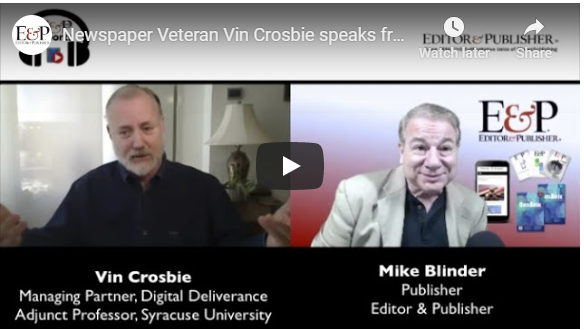Interview by Editor & Publisher magazine

The U.S. newspaper industry’s trade journal interviews Vin Crosbie about that industry’s bright past and dim future.

The U.S. newspaper industry’s trade journal interviews Vin Crosbie about that industry’s bright past and dim future.

Computer mediation means mediation, not simply electronic delivery. It means sorting and processing information on massive scales, which is what computerized technologies do best. They can sort, process, and deliver an individualized (i..e, individuated) supply of news to fit each individual consumer’s unique mix of needs, interests, and tastes. Computer-mediated technologies do this algorithmically. Computer-mediation is the hallmark of the dawning Informational Era. It makes no sense for legacy media industries not to embrace, adopt, and utilize these historically newfound capabilities. To use computer-media technologies merely as a means of electronic delivery is akin to using horses to pull an automobile along a paved road: a myopic misuse of capabilities.
Any technologies that can supply a consumer with the most precise mix of stories that match his own individual needs, interests, beliefs, and tastes, will triumph over technologies less precise. That is the reason why Google and other information search engines, why Facebook and other social media services, and why topical or ‘niche’ services that offer individuated feeds of music or other genres of information, have become so explosively successful during the past 20 years. Although they were not initial designed to provide consumers with individuated feeds of news, their computer-mediated algorithmic software can do so, as literally billions of consumers have discovered. This is why consumers now use such computer-mediated Individuated Media services as their predominant means by which they obtain news, entertainment, and other information, to the grave distress of legacy media industries that failed to adopt such technologies. That is how daily newspapers lost the future.